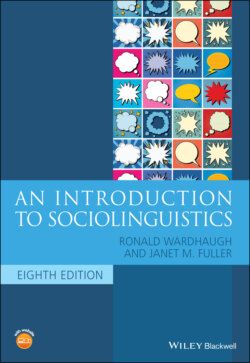Читать книгу An Introduction to Sociolinguistics - Ronald Wardhaugh, Janet M. Fuller - Страница 78
Monoglossic ideologies
ОглавлениеThe final type of ideology we will discuss here is what are called monoglossic ideologies, which value monolingualism over multilingualism. We refer to this in the plural as there are different monoglossic ideologies – ‘the one nation–one language’ ideology, for example, which demands strict indexicality between a language and a nation. Monoglossic ideologies may also include purist attitudes about borrowing (i.e., that the language should remain ‘pure’ from the influence of other languages). Monoglossic ideologies stigmatize language mixing, a topic we will return to in chapter 8.
Again, it is important to note that while hegemonic ideologies – for example the ideology that national belonging is indexed through the national language – do exist, this hegemony may be challenged. In a study about Ukrainian language ideologies Seals (2019) notes that some young Ukrainians in her study claimed that ‘it doesn’t matter what you speak,’ and argued that speaking Russian did not make you less Ukrainian. This challenge to the monoglossic ideology of ‘one nation–one language’ illustrates another aspect of hegemony: although it can be challenged, the challenges must recognize (and thus reproduce) the hegemonic ideology. The protest that the link between the Ukrainian language and Ukrainian identity is not absolute must also acknowledge the pervasive ideology of an indexical relationship between language and national identity.
